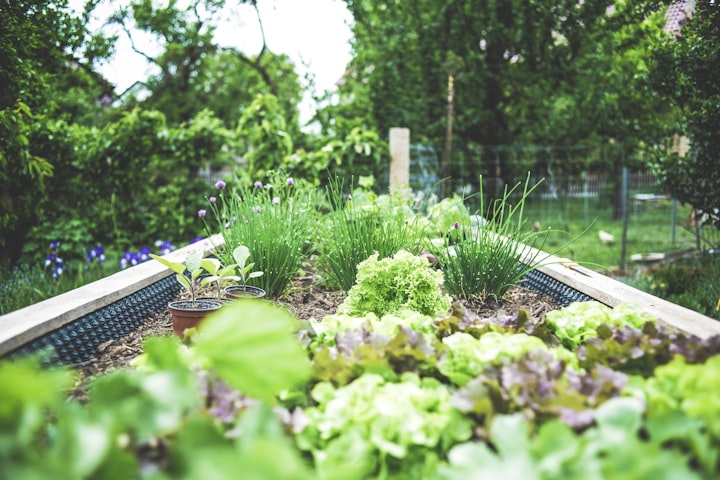Tips For Creating An Herb Garden
Beginner's Guide to Creating an Herb Garden: Tips for Success

Creating an herb garden is a wonderful way for beginners to connect with nature, enjoy fresh flavors, and enhance their culinary adventures. Whether you have a spacious backyard or a tiny balcony, growing herbs is a rewarding and accessible endeavor. In this comprehensive guide, we will provide beginner-friendly tips and step-by-step instructions to help you create a thriving herb garden. From choosing the right location to harvesting your homegrown herbs, let's embark on this exciting journey together and unlock the joys of herb gardening.

Location and Sunlight
Selecting the right location is crucial for the success of your herb garden. Most herbs thrive in a sunny spot that receives at least six hours of direct sunlight each day. Observe your outdoor space or balcony to identify areas that offer ample sunlight. If you have limited access to natural light, consider growing herbs indoors near a bright window or using artificial grow lights to supplement sunlight.
Anything you need for your Herb garden

Choosing Herb Varieties
When starting an herb garden, it's essential to choose herbs that suit your taste preferences, cooking style, and climate. Begin with a selection of common and versatile herbs such as basil, rosemary, thyme, mint, parsley, and chives. These herbs are relatively easy to grow and offer a range of flavors for various culinary dishes. Check your local gardening center or seed catalogs for recommended herb varieties that are well-suited to your climate and growing conditions.

Soil Preparation and Drainage
Herbs thrive in well-draining soil with adequate moisture retention. Before planting, prepare the soil by removing any weeds, rocks, or debris. Incorporate organic matter such as compost, well-rotted manure, or peat moss to improve soil fertility and drainage. Ensure the soil is loose and crumbly to allow roots to grow easily and water to penetrate. If you're gardening in containers, choose a high-quality potting mix specifically formulated for herbs.

Planting and Spacing
When planting your herbs, follow the recommended spacing guidelines provided on seed packets or plant tags. This will ensure that each herb has enough room to grow and receive adequate sunlight and airflow. Generally, herbs should be spaced 12 to 18 inches apart in the ground. If you're using containers, choose appropriately sized pots that allow for proper root development and provide sufficient space for each herb to thrive.
Anything you need for your Herb garden

Watering and Moisture
Proper watering is crucial for herb garden success. Herbs prefer evenly moist soil, so water them regularly to keep the soil consistently damp but not waterlogged. Check the moisture level by sticking your finger about an inch deep into the soil – if it feels dry, it's time to water. Avoid overhead watering, as this can promote disease. Instead, water at the base of the plant to direct moisture to the roots. Consider using a drip irrigation system or a watering can with a narrow spout for precise watering.
Anything you need for your Herb garden

Mulching and Weed Control
Mulching is an effective technique to conserve moisture, suppress weeds, and maintain a more even soil temperature. Apply a layer of organic mulch, such as straw, wood chips, or shredded leaves, around your herb plants. This will help retain soil moisture, prevent weed growth, and provide insulation. Avoid piling mulch directly against the stems of your herbs, as this can lead to moisture-related issues and encourage pests.
Anything you need for your Herb garden

Pruning and Harvesting
Pruning herbs is essential for promoting bushier growth, preventing legginess, and maximizing the production of leaves. Regularly pinch or trim off the tips of your herbs to encourage lateral branching. This will result in a fuller and more productive plant. As your herbs mature, harvest the leaves as needed. For most herbs, it's best to harvest in the morning when the essential oils are at their peak. Use sharp scissors or pruning shears to snip off the outer leaves, allowing the inner growth to continue thriving.

Fertilization and Nutrients
Herbs generally do not require heavy fertilization, but it's beneficial to provide them with some nutrients to promote healthy growth. Use a balanced organic fertilizer or compost once or twice during the growing season. Avoid over-fertilizing, as it can lead to excessive foliage growth and a decrease in flavor potency. Pay attention to the specific fertilization requirements of each herb, as some may have unique needs.
Anything you need for your Herb garden

Pest and Disease Management
Keeping your herb garden healthy requires monitoring for pests and diseases. Inspect your herbs regularly for signs of pests such as aphids, snails, or caterpillars. Consider natural pest control methods like handpicking or using insecticidal soaps or organic repellents. Promote a healthy garden environment by ensuring good airflow, proper spacing, and removing any diseased or damaged foliage promptly.

Continuous Learning and Experimentation :
Herb gardening is a journey of continuous learning and experimentation. Read books, online resources, and gardening forums to expand your knowledge. Learn about the unique qualities and growth habits of different herbs, explore various cultivation techniques, and try growing new varieties. Every season presents an opportunity to refine your gardening skills and deepen your understanding of herbs.
Conclusion
Starting an herb garden as a beginner is an exciting and rewarding endeavor. By following these tips, you'll be well-equipped to create a thriving herb garden that brings joy, flavors, and a deeper connection to nature into your culinary experiences. Embrace the process, be patient, and enjoy the bountiful harvest of your own homegrown herbs.





Comments
There are no comments for this story
Be the first to respond and start the conversation.